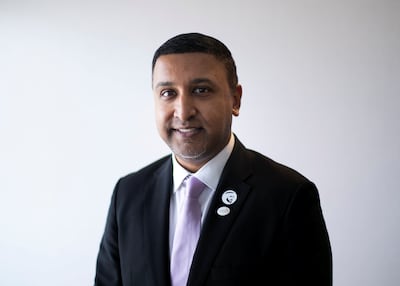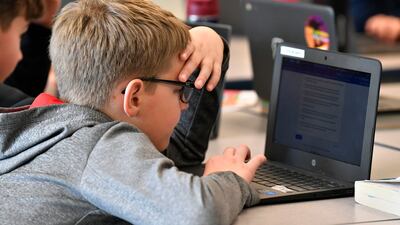UAE schools are trying out new technologies to prevent pupils using AI programs such as ChatGPT to cheat.
Embracing AI is the way forward, many headteachers say - but pupils should not be allowed to use it to avoid work.
Zero GPT and other tools help to detect if something has been written by a human or by ChatGPT or Google Bard.
Vaughan Pope, head of education technology at Taaleem, said simply banning ChatGPT and other digital systems was not the solution.
head of education technology at Taaleem
“Our ethos has not been to ban digital systems that we can’t deal with but rather teach the effective and responsible use of digital technologies," he said.
“We have instead sought to bring this conversation back to digital citizenship and online safety, where pupils are taught how to act and engage with digital solutions responsibly.
“As a further safety net, we have also recently seen the development of applications and systems that can identify AI-generated written works through the lack of randomness or extreme uniform language.”
Banning ChatGPT is not the solution
Educators across the world are working on dealing with the impact of ChatGPT on education with many choosing to restrict access to the tool.
New York City Public Schools banned ChatGPT early last month, while the Los Angeles Unified School District banned it in December and Sciences Po, a university in Paris, has also prohibited the use of the tool.
Mr Pope said ChatGPT, with the correct guidance, could be useful for teachers and in education generally.
He said a phone and web application that could recognise patterns in natural language was being explored, and new plagiarism checkers would have this mechanism in-built.
“AI-generated language is very uniform in patterns of language, versus normal human language, which tends to have a sense of randomness in it,” Mr Pope said.
“We're not using this [yet]. We’re waiting for the technology to be further developed before using it, we do believe it's going to be included in things like our plagiarism checkers.”
Mr Pope said plagiarism had always been a concern for educators, especially with AI-generated language being a lot more difficult to detect.
Steven Lupton, head teacher at Repton Abu Dhabi, said the school was exploring options such as tools to help detect if a text was generated by ChatGPT.
"It's very, very challenging at the moment," he said. "And I suppose it's very much in the initial stages because the actual technologies only surfaced a few weeks ago.
"I don't think prohibition is the answer."
The school has found ways to create assignments and change questioning methods that do not allow for simple responses, so pupils cannot use AI tools for assignments.
“It is about educating our pupils and trying to help them understand that their critical thinking or problem-solving skills are critical to their success," said Mr Lupton.
How teachers could use ChatGPT to reduce their workload
Geoffrey Alphonso, chief executive at Alef Education, a UAE-based technology company, said whether schools banned ChatGPT or not, pupils would find a way to use it.
“In an academic setting, when you're dealing with high-stakes assessments, there maybe needs to be a little bit of a calibration," he said.
Mr Alphonso said developing technology would soon result in some of the bigger companies releasing their own AI tools.
"I think there needs to be a real sit-down meeting of the minds to try to find the right leverage, as opposed to just restricting or banning it," he said.

He said it would take a combined effort with various people in the realm of education. For example, the technology would help teachers to create content and lesson plans in a more streamlined fashion and allow them to focus more on pupils.
He said there could be an emergence of technology that tried to validate whether something had been written by a machine or not, and in some cases it could be a machine itself that did the validation.
Sreejit Chakrabarty, director of robotics and artificial intelligence at Dubai American Academy, said that with ChatGPT being widely available in the public domain, it was not practical to try to censor or restrict its use.
The school has created resources for teachers to integrate ChatGPT into their daily work.
"Instead of trying to prevent pupils from using it, we have chosen to educate and empower them to use it responsibly, beginning with our staff," said Mr Chakrabarty.
"We have organised multiple professional development sessions already for our teachers on the topic of ChatGPT, including its potential benefits and how to detect its use in academic work."









